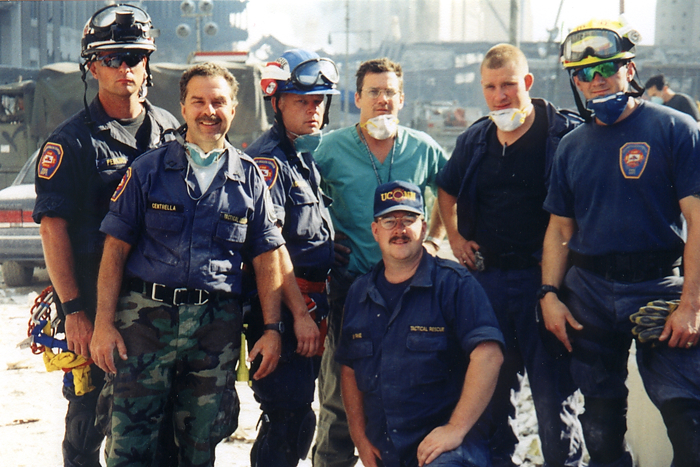It has been 15 years now since the worst terror attack on U.S. soil, and it’s possible everyone who is old enough to remember Sept. 11, 2001, always will. For those who responded to the disaster scene in lower Manhattan that day, the memories remain especially vivid.
“I remember the blueness of the sky and overall feeling of how great it was to be alive as I stood on the apron of the apparatus bay,” says then-UConn Health Fire Capt. Carmine Centrella. “Lt. Freddie Weeks came out to tell me that one of the World Trade Center towers was struck by a plane, and I remember a general feeling of nonchalance but feeling a little sorry about the poor soul aboard a small plane who was mostly likely dead after hitting a tower. Minutes later as I walked into the day room, the second tower was hit, and how we prepare and respond changed forever.”
UConn Deputy Fire Chief Greg Priest, then an acting lieutenant at UConn Health, recalls, “We watched live as the second plane flew into the towers and I remember Captain Centrella literally falling on his knees, given the magnitude.”
Later that morning came a notification from the Port Authority of New York and New Jersey requesting specialized medical rescue teams and equipment. UConn Health leaders agreed to send six tactical paramedics from the UConn Health Fire Department and the lead physician from the UConn John Dempsey Hospital Emergency Department to what would become known as Ground Zero.
“Hospital administration was willing to jump in,” says Dr. Rob Fuller, the deployed emergency physician. “They told us to take what we need and get going. They didn’t hesitate. It was a proud moment for the institution.”

Little did they know what they were in for.
“We were directed by NYPD down the east side of Manhattan until we reached the end of the FDR Expressway at Broadway a little before 6 p.m.,” Centrella says. “As we turned down Broadway, it was as if someone turned off the lights. We went from a bright evening to total darkness in a moment.”
“I remember being in awe at the cloud of dust that we saw coming over the bridge into New York City,” Priest recalls.
Fuller says, “I remember being full of anticipation, anxiety, confusion, feeling a little scared and disorganized.”
The initial shock of the attack on America and the collapse of the twin towers was still resonating; then came another devastating blow: The grim realization by Fuller and these specially trained paramedics – men who dedicated their careers to providing lifesaving medical care in the field – that there were no lives to save. The field was obliterated.
“Still I can recall with vivid clarity that entire day, from where I was when the first plane hit the tower, to getting the call that we were deploying, to going to my daughter’s school to say goodbye not knowing what the next hours would bring, to the disappointment I felt when we made the decision to return home knowing that our lifesaving services would not be needed,” says retired UConn Health Fire Chief Bill Perkins, then a captain.
“I guess you might call that my lasting memory, the magnitude of the destruction yet the relatively little that could be done to help save lives that had not already been lost,” Priest says.

Tactical paramedics are trained in specialized rescue. They come equipped with the gear and expertise to work in a hazardous environment. Fuller recalls the UConn paramedics extricating a rescue worker from the rubble, and a few responders from other jurisdictions in need of medical attention, but little else in the way of people to care for.
“The transition from search and rescue to search and recovery happened pretty fast. We were out of our league pretty quickly,” Fuller says. “We weren’t able to see much news coverage that day, so we had a different experience than most, but we did have that feeling of hopeless and sadness like the whole country felt, like the wind was knocked out of us that we were being attacked.”
Not much more than 24 hours after they arrived, Fuller, Perkins, Priest, Centrella, and the rest of the group – UConn Health firefighter paramedics John Kowalski, Daryl Byrne, and Ben Sonstrom – left to give way for recovery personnel.
“As we made our way through Manhattan to 12th Avenue and the upper west side, the streets were eerily empty,” says Centrella, who retired from UConn Health as the chief fire officer in 2004. “And then we turned onto 12th Avenue and there were thousands of New Yorkers lining the streets, cheering and waving flags and signs thanking responders. I’m pretty sure I haven’t had a lump in my throat like that in my life, before or since.”
“What also won’t be forgotten is the support that I and we as a team experienced upon our arrival back to UConn Health,” says Perkins, who retired in 2009. “For most of us it was a little unnerving to be that much in the public eye. For myself, I felt funny being grouped in to the hero’s status. To me the true heroes are listed on a memorial where the towers once stood.”
Day of Remembrance at UConn Health Friday
Centrella and Fuller are among the scheduled speakers for a Day of Remembrance on Friday, Sept. 9, at noon in the Keller Auditorium. Lt. Gov. Nancy Wyman is the featured guest speaker. The UConn Health Fire and Police Department Honor Guard will present the colors, and UConn Health police officer Susan Kassey will present a poem. Chaplain Catherine Wilcox will give closing remarks, and light refreshments will be served.



